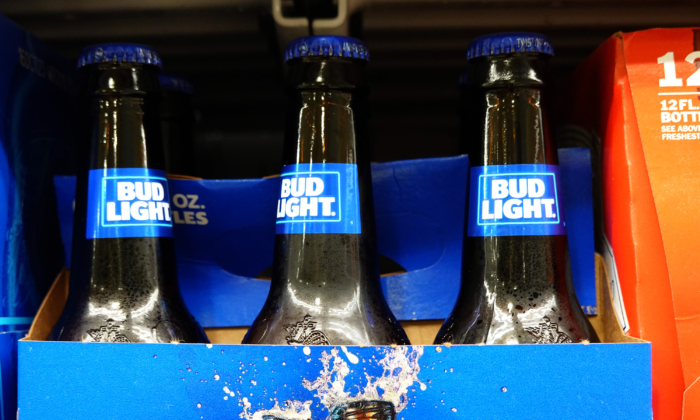


Molson Coors CEO Gavin Hattersley said Tuesday that Bud Light's boycott-driven loss of market share in favor of rival Coors Light and Miller Lite brands represents a "permanent shift" in the American beer market.
Sales of Miller Lite and Coors Light have been buoyed by the backlash to Bud Light's marketing partnership with transgender influencer Dylan Mulvaney.
Mr. Mulvaney, a man who identifies as a woman, showed off a personalized Bud Light beer can with his likeness on it in a video on social media on April Fool's day, sparking conservative backlash and widespread calls for a boycott.
Related Stories
In the six months since Mr. Mulvaney first revealed the personalized beer can, sales of Bud Light have tanked.

In August, Molson Coors reported that, in the second quarter of 2023, its two key brands outsold Bud Light by 50 percent as drinkers continued to turn their back on the Anheuser Busch-made beer amid the transgender marketing fiasco.
A number of industry analysts have there appears to be no end in sight to the Bud Light slump and that it's "hard not to be negative" about the brand's outlook. One beer industry expert said recently that the company's decline seems "quasi-permanent."
And now, the Molson Coors CEO has added his voice to those predicting no bounce-back to Bud Light's former glory.
“We’re now more than six months into it and we feel very confident based on all the data we’ve seen that this is a permanent shift,” Mr. Hattersley said.
In 2022, Bud Light was bigger than both Coors Light and Miller Lite combined. But by the second quarter of 2023, amid the Mulvaney fiasco, the two brands combined were 50 percent bigger than Bud Light by total industry dollars.
Also, over a one-month period ending in early September, sales of Bud Light fell about 27 percent year over year, according to Bump Williams Consulting.
The Epoch Times has reached out to Bud Light parent Anheuser-Busch with a request for comment on the Molson Coors CEO's remarks.
Bud Light Might Lose Shelf Space
Some experts have forecast that Bud Light will soon lose coveted retail shelf space amid the slump.Beer industry experts, wholesalers, and a former Anheuser-Busch executive told ABC News Friday that places like 7-Eleven, QuikTrip, and Walmart may decrease Bud Light's refrigerator space in stores.
“During a busy shopping period on a Friday or Saturday night, if you don’t have the beer available cold on the shelf, consumers pick something else,” former Anheuser-Busch InBev executive Anson Frericks, a frequent critic of his former company, told the outlet. He noted that shelf space is “the single largest determinant of sales in a store," and warned there will be a "dramatic shift" for Bud Light.
Dave Williams, vice president of analytics and insights at Bump Williams Consulting, said that retailers often watch for sales figures to determine what brands would be given the best shelf space.
“There’s explosive growth on one side and sharp decline on the other,” Mr. Williams said, according to the broadcaster. “This does have that ripple effect where if Bud Light loses space on the shelf, that could make it a longer-term endeavor to claw back to where they were if they’re ever able to do that in the first place.”
According to a report from Drinks Market Analysis from several years ago, about 80 percent of beer sales occur at retailers or similar locations where consumers take the product home. The other 20 percent of sales occur at restaurants and bars.
The Backlash
At the beginning of April, Mr. Mulvaney, who has more than 10 million followers on TikTok, posted a series of videos promoting Bud Light and showing off the personalized can.“This month, I celebrated my day 365 of womanhood, and Bud Light sent me possibly the best gift ever—a can with my face on it,” Mr. Mulvaney said in a video posted on social media on April Fool's Day.
Conservatives accused the brand of promoting a transgender agenda and called for a boycott.
Singer Kid Rock used Bud Light cans as target practice to express his anger at the promotional campaign, while Florida Gov. Ron DeSantis said he would be boycotting Bud Light.

Former President Donald Trump also weighed in on the controversy, suggesting boycotts can be an effective way to send a message to brands that critics say are pushing a leftist agenda.
"It's time to beat the Radical Left at their own game," President Trump wrote in a post on Truth Social in May. "Money does talk—Anheuser-Busch now understands that."
Since the boycott calls began in April, Anheuser-Busch InBev has lost billions of dollars in revenue.
Amid the fallout, the market value of Anheuser-Busch InBev has sunk to about $107.03 billion as of Oct. 4, from about $132.4 billion on April 1, the day Mr. Mulvaney showed off the personalized can on social media.
In another sign that the boycott is having an impact, Bud Light has been replaced as the top-selling brand in the United States by competitor Modelo.
Jack Phillips contributed to this report.

